|
|
|
Sort Order |
|
|
|
Items / Page
|
|
|
|
|
|
|
| Srl | Item |
| 1 |
ID:
062593
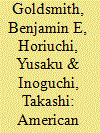

|
|
|
| 2 |
ID:
078245
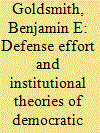

|
|
|
|
|
| Publication |
2007.
|
| Summary/Abstract |
Examining the relationship between regime type and defense effort provides evidence for reformulating theories of democratic peace. Consistent with liberal theories, regime type has substantively and statistically significant effects. In times of peace, democracies bear lower defense burdens than other states and keep proportionately fewer soldiers under arms. During times of war, however, democracies try harder and exert greater defense effort than non-democracies. Contrary to the results of some recent studies, all other things being equal, the arsenal of democracy appears to out-gun its opponents when it counts. Examining three components of democracy separately indicates that a largely overlooked factor, political competition, tends to drive these outcomes. Executive constraints are also associated with increased defense effort during war. But there is little evidence that wide participation or large winning coalitions have the predicted effects on defense effort. The results point to the flexible quality of defense effort in democracies, which is theoretically and empirically accounted for by the competitive political environment rather than institutional factors favored by existing theories
|
|
|
|
|
|
|
|
|
|
|
|
|
|
|
|
| 3 |
ID:
119484
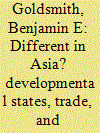

|
|
|
|
|
| Publication |
2013.
|
| Summary/Abstract |
In this article, I ask what might be the effect of international trade on interstate conflict in Asia and the Pacific. Overall, the associations of trade interdependence and trade volume in the region appear similar to those globally: interdependence is accompanied by a reduction in the chance of militarized conflict onset, whereas the volume of trade appears to reduce the chance of conflict escalation to deadly international violence. I suggest a partial exception for East Asia, implying weaker associations between trade and pacific outcomes. I argue that the regionally common 'developmental state' model allows such states to more freely, but less credibly, use trade as a foreign policy tool, reducing trade's constraint upon East Asian states in security affairs. Analyses of East Asian dyads and of developmental states in data from all regions of the globe support my contention that trade interdependence has weaker pacific effects in these contexts, although some other expectations are not supported.
|
|
|
|
|
|
|
|
|
|
|
|
|
|
|
|
| 4 |
ID:
181565
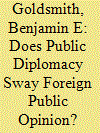

|
|
|
|
|
| Summary/Abstract |
Although many governments invest significant resources in public-diplomacy campaigns, there is little well-identified evidence of these efforts’ effectiveness. We examine the effects of a major type of public diplomacy: high-level visits by national leaders to other countries. We combine a dataset of the international travels of 15 leaders from 9 countries over 11 years, with worldwide surveys administered in 38 host countries. By comparing 32,456 respondents interviewed just before or just after the first day of each visit, we show that visiting leaders can increase public approval among foreign citizens. The effects do not fade away immediately and are particularly large when public-diplomacy activities are reported by the news media. In most cases, military capability differentials between visiting and host countries do not appear to confer an advantage in the influence of public diplomacy. These findings suggest that public diplomacy has the potential to shape global affairs through soft power.
|
|
|
|
|
|
|
|
|
|
|
|
|
|
|
|
| 5 |
ID:
131387
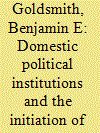

|
|
|
|
|
| Publication |
2014.
|
| Summary/Abstract |
There is doubt about whether the 'democratic peace' proposition applies in Asia. I theoretically deconstruct regime type into institutional components including political competition, constraint on the executive, and mass participation, and ask whether taking these as distinct causal factors gives more empirical purchase on the relationship of domestic political institutions to states' external conflict behavior. I find that higher levels of political competition are associated with a lower likelihood of conflict initiation, but only when the potential target is relatively democratic. Thus, my directed-dyad analysis is consistent with a democratic peace effect in East Asia. It is also suggestive regarding the observed 'East Asian peace' that has existed since 1979, because levels of political competition have risen considerably in the region, beginning in the late 1970s.
|
|
|
|
|
|
|
|
|
|
|
|
|
|
|
|
| 6 |
ID:
122897
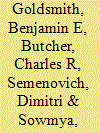

|
|
|
|
|
| Publication |
2013.
|
| Summary/Abstract |
We present what is, to the best of our knowledge, the first published set of annual out-of-sample forecasts of genocide and politicide based on a global dataset. Our goal is to produce a prototype for a real-time model capable of forecasting one year into the future. Building on the current literature, we take several important steps forward. We implement an unconditional two-stage model encompassing both instability and genocide, allowing our sample to be the available global data, rather than using conditional case selection or a case-control approach. We explore factors exhibiting considerable variance over time to improve yearly forecasting performance. And we produce annual lists of at-risk states in a format that should be of use to policymakers seeking to prevent such mass atrocities. Our out-of-sample forecasts for 1988-2003 predict 90.9% of genocide onsets correctly while also predicting 79.2% of non-onset years correctly, an improvement over a previous study using a case-control in-sample approach. We produce 16 annual forecasts based only on previous years' data, which identify six of 11 cases of genocide/politicide onset within the top 5% of at-risk countries per year. We believe this represents substantial progress towards useful real-time forecasting of such rare events. We conclude by suggesting ways to further enhance predictive performance.
|
|
|
|
|
|
|
|
|
|
|
|
|
|
|
|
| 7 |
ID:
114499
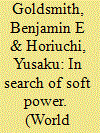

|
|
|
|
|
| Publication |
2012.
|
| Summary/Abstract |
Does "soft power" matter in international relations? Specifically, when the United States seeks cooperation from countries around the world, do the views of their publics about US foreign policy affect the actual foreign policy behavior of these countries? The authors examine this question using multinational surveys covering fifty-eight countries, combined with information about their foreign policy decisions in 2003, a critical year for the US. They draw their basic conceptual framework from Joseph Nye, who uses various indicators of opinion about the US to assess US soft power. But the authors argue that his theory lacks the specificity needed for falsifiable testing. They refine it by focusing on foreign public opinion about US foreign policy, an underemphasized element of Nye's approach. Their regression analysis shows that foreign public opinion has a significant and large effect on troop commitments to the war in Iraq, even after controlling for various hard power factors. It also has significant, albeit small, effects on policies toward the International Criminal Court and on voting decisions in the UN General Assembly. These results support the authors' refined theoretical argument about soft power: public opinion about US foreign policy in foreign countries does affect their policies toward the US, but this effect is conditional on the salience of an issue for mass publics.
|
|
|
|
|
|
|
|
|
|
|
|
|
|
|
|
| 8 |
ID:
124521
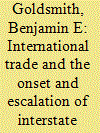

|
|
|
|
|
| Publication |
2013.
|
| Summary/Abstract |
Although study of the relationship between international trade and militarized conflict has become more sophisticated, whether trade reduces the chance of conflict, exacerbates it, or has no effect, remains contested. Integrating expectations from schools of thought often portrayed as incompatible, I consider two aspects of trade - volume and interdependence - and model conflict as a two-stage process involving onset and escalation. This perspective leads to robust statistical findings that trade is Janus-faced, both facilitating and inhibiting conflict at different stages, supporting the conclusion that a focus on international conflict as a communication process promises better theory in international relations.
|
|
|
|
|
|
|
|
|
|
|
|
|
|
|
|
| 9 |
ID:
083440
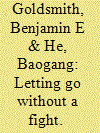

|
|
|
| 10 |
ID:
182680
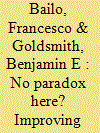

|
|
|
|
|
| Summary/Abstract |
This article contributes to both the theoretical elaboration and empirical testing of the ‘stability–instability paradox’, the proposition that while nuclear weapons deter nuclear war, they also increase conventional conflict among nuclear-armed states. Some recent research has found support for the paradox, but quantitative studies tend to pool all international dyads while qualitative and theoretical studies focus almost exclusively on the USA–USSR and India–Pakistan dyads. This article argues that existing empirical tests lack clearly relevant counterfactual cases, and are vulnerable to a number of inferential problems, including selection on the dependent variable, unintentionally biased inference, and extrapolation from irrelevant cases. The limited evidentiary base coincides with a lack of consideration of the theoretical conditions under which the paradox might apply. To address these issues this article theorizes some scope conditions for the paradox. It then applies synthetic control, a quantitative method for valid comparison when appropriate counterfactual cases are lacking, to model international conflict between India–Pakistan, China–India, and North Korea–USA, before and after nuclearization. The article finds only limited support for the paradox when considered as a general theory, or within the theorized scope conditions based on the balance of resolve and power within each dyad.
|
|
|
|
|
|
|
|
|
|
|
|
|
|
|
|
| 11 |
ID:
154956
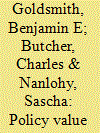

|
|
|
|
|
| Summary/Abstract |
It is time to integrate quantitative atrocity forecasting more directly and systematically into the foreign policy processes of middle and major powers interested in preventing these terrible but all too common events. Sascha Nanlohy, Charles Butcher and Benjamin E Goldsmith discuss the potential utility of relatively reliable mid-to-long-term forecasts, using a number of examples to illustrate the main points.
|
|
|
|
|
|
|
|
|
|
|
|
|
|
|
|
| 12 |
ID:
154392
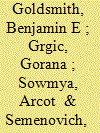

|
|
|
|
|
| Summary/Abstract |
Although some scholars claim that the empirical evidence for the very low instance of interstate war between democracies is well established, others have raised new challenges. But even if democratic peace is observed, its theoretical explanation remains unresolved. Consensus has not emerged among competing approaches, some of which are criticized for offering monadic logic for a dyadic phenomenon. This article synthesizes recent literature to advance a simple, but distinct, explicitly dyadic theory about institutionalized political competition, leading to expectations that it is the most important source of democratic peace. While the authors are far from the first to consider political competition, their approach stands out in according it the central role in a dyadic theory focused on the regime type of initiators and target states. They argue that potential vulnerability to opposition criticism on target-regime-specific normative and costs-of-war bases is more fundamental than mechanisms such as audience costs, informational effects, or public goods logic. Incumbents in high-competition states will be reluctant to initiate conflict with a democracy due to anticipated inability to defend the conflict as right, necessary, and winnable. The authors present new and highly robust evidence that democratic peace is neither spurious nor a methodological artifact, and that it can be attributed to high-competition states’ aversion to initiating fights with democracies.
|
|
|
|
|
|
|
|
|
|
|
|
|
|
|
|
| 13 |
ID:
084991
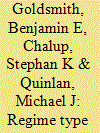

|
|
|
|
|
| Publication |
2008.
|
| Summary/Abstract |
The authors take a new look at the relationship between regime type and deadly militarized conflict among pairs of states (dyads) in the international system. With the goal of describing the general functional form, they evaluate three perspectives: democratic peace, regime similarity and regime rationality. They employ both standard logistic regression (logit) and a recently developed machine learning technique, a support vector machine (SVM). Logit is dependent on assumptions that limit flexibility and make it difficult to discern the appropriate functional form. SVM estimation, on the other hand, is highly flexible and appears capable of discovering a relationship that is contingent on other variables in the model. SVM results indicate that regime similarity and joint democracy are important in most dyadic interactions. However, for the special but important case of the most dangerous dyads, regime rationality plays a role and the democratic peace effect is dominant. The results suggest that models of international conflict excluding distinct indicators for political similarity, joint democracy and joint autocracy may be misspecified. SVMs are an especially useful complement to conventional statistical methods.
|
|
|
|
|
|
|
|
|
|
|
|
|
|
|
|
| 14 |
ID:
075743
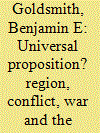

|
|
|
|
|
| Publication |
2006.
|
| Summary/Abstract |
This article assesses the robustness of the liberal or 'Kantian' peace propositions by challenging two common practices: pooling data for different geographic regions, and using conflict at any level as a proxy for interstate war. The findings indicate that there are substantial differences between regions in the effects of democracy, economic interdependence, and international organizations. Conflict (all MIDs) and war have considerably different relationships to these key variables, and to each other, across regions. While I do not argue that these results undermine the general Kantian peace propositions, they do represent powerful qualifications that provide insight into theoretical foundations and raise related questions of specification error. They also point to the continuing importance of concepts such as security communities and norms as liberal factors distinct from the Kantian variables.
|
|
|
|
|
|
|
|
|
|
|
|
|
|
|
|
|
|
|
|
|